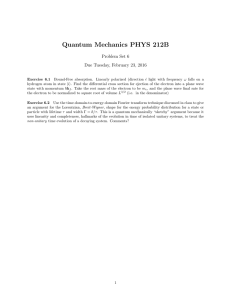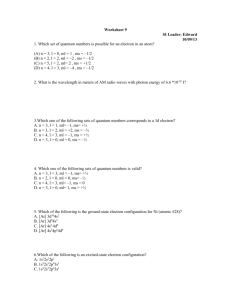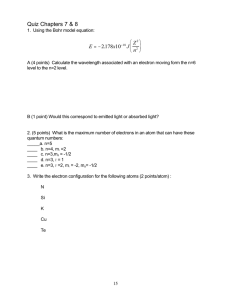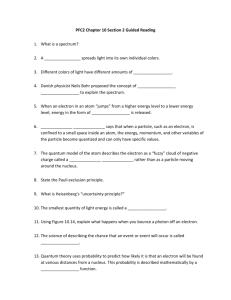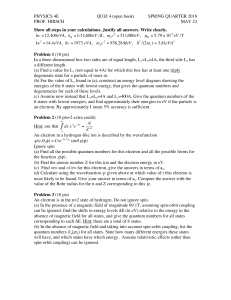3z-NST-1DQ-Confinement
advertisement
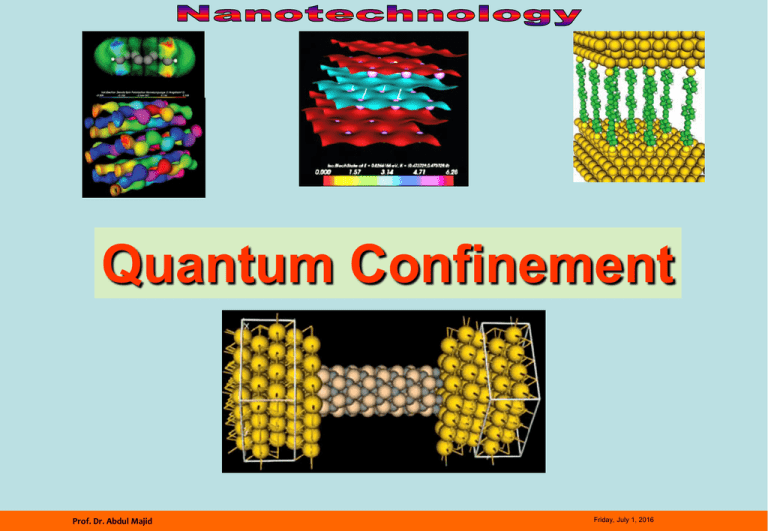
Quantum Confinement Prof. Dr. Abdul Majid Friday, July 1, 2016 Prof. Dr. Abdul Majid Friday, July 1, 2016 Is Size mater for Physical Properties ? : Quantum Confinement Quantum Confinement effects in InP nanowires. Figure shows the photoluminescence of InP nanowires as a function of wire diameter, thereby providing direct information on the effective bandgap. As the wire diameter of an InP nanowire is decreased so that it becomes smaller than the bulk exciton diameter of 19 nm, quantum confinement effects set in, and the band gap is increased. This results in an increase in the PL peak energy. The smaller the effective mass, the larger the quantum confinement effects. When the shift in the peak energy as a function of nanowire diameter Fig. is analysed using an effective mass model, the reduced effective mass of the exciton is deduced to be 0.052 m0, which agrees quite well with the literature value of 0.065 m0 for bulk InP. Photo-luminescence of InP nanowires of varying diameters at 7K((b)and (d)) and room temperature ((a) and (c)) showing quantum confinement effects of the exciton for wire diameters of less than 20 nm Prof. Dr. Abdul Majid Although the line widths of the PL peak for the small-diameter nanowires (10 nm) are smaller at low temperature (7K), the observation of strong quantum confinement and bandgap tunability effects at room temperature are significant for photonics applications of nanowires. Friday, July 1, 2016 Tunnelling Quantum tunneling through a barrier. At the origin (x=0), there is a very high, but narrow potential barrier. A significant tunneling effect can be seen. Prof. Dr. Abdul Majid Friday, July 1, 2016 Tunnelling An electron wavepacket directed at a potential barrier. Note the dim spot on the right that represents tunnelling electrons. Prof. Dr. Abdul Majid Friday, July 1, 2016 One Dimension Confinement I Cont….. The values of the kinetic energy for free motion in the y- and z-directions are defined by Eq. The Schrodinger equation for the x-coordinate differs from since it contains a term with potential energy U(x): OR For the region 0 < x < L where U(x) = 0 and where the electron is confined, the Schrodinger equation takes the form Where The solutions to differential equations can be sought in the form of a combination either of harmonic functions or of exponential functions Prof. Dr. Abdul Majid Friday, July 1, 2016 One Dimension Confinement I Cont….. if A' -B' A' (e ikx e ikx ) 0 (e ikx e ikx ) By using the identity Sin (kx) 2i 2i Sin (kx) (e ikx e ikx ) (x) C Sin (kx), Wher e C 2iA This leads us to the important conclusion that a confined electron can never be in a state of rest. Even in its ground state the electron has non-zero momentum, i.e., from the point of view of classical mechanics the electron is in a state of constant motion. This is a direct consequence of Heisenberg’s uncertainty principle and wave–particle duality. Wave function at x=0 and at x=L Sin (kx) 0; Sin (kL) 0 Following allowed values of the wavenumber, k, for the electron’s wavefunction in the potential well being considered kn L n where n 1,2,3,...... The relation of this parameter with the electron’s energy, 2 k n2 En 2me 2 2 2 2me L n2 where n 1,2,3,...... This is an important conclusion that the electron energy in the potential well cannot change continuously – it can have only certain discrete values of allowed energies as shown in figure. Prof. Dr. Abdul Majid FIG. Quantization of an electron’s energy in a potential well with impenetrable walls of U(0)=∞and U(L)=∞. The two lowest energy levels, E1 and E2, and the Corresponding wavefunctions, ψ1 and ψ2. Friday, July 1, 2016 One Dimension Confinement I Cont….. The electron energy, En, in the potential well is thus quantized and the parameter n, which defines the electron energy state, is called the principal quantum number. For n = 1 the electron’s energy is minimal often called the ground state and equal to 2 k12 E1 2me 2 2 2me L2 n2 0.3737 eV 2 L For the type of potential well considered here the positions of the energy states are not equidistant. The distance between adjacent energy states increases with increasing quantum number, n, according to the law ΔE En1- En ( 2n 1 )E1 If the width of the potential well, L, within which the electron is confined (for example the width of the abovementioned semiconductor film) increases, then the energy of the ground state E1 decreases and therefore the distance between the energy states, E, decreases and tends to zero at L →∞. The energy spectrum transforms from a discrete spectrum into a quasicontinuous or practically continuous spectrum and the electron’s behavior becomes classical. Prof. Dr. Abdul Majid Friday, July 1, 2016 One Dimension Confinement I Cont….. The unknown coefficient in the expression for the wavefunction can be found from the normalization condition: Calculation of this integral gives us Calculation of this integral gives us The parameter C will be The wavefunction of the electron in the potential well for the nth energy state can be written as FIG. The probability density distributions, |ψ1(x)|2 and |ψ2(x)|2, for the two lowest energy levels, E1 and E2, in a well with impenetrable walls The graphs of the wave functions ψ1(x) and ψ2(x) for n = 1 and n = 2, are shown in Fig. The distribution of the probability density, |ψn(x)|2, of finding an electron in the region of the potential well whose number of maxima is determined by the quantum number n is shown in Fig. We see that in the ground state (n = 1) the probability of finding an electron has a maximum at the center of the potential well. In the first excited state (n = 2) the probability of finding an electron at the center of the well is equal to zero, whereas the probability of finding an electron has maxima at the points x = L/4 and x = 3L/4. This behavior of the electron differs drastically from the behavior of a classical particle in a potential well Prof. Dr. Abdul Majid Friday, July 1, 2016 Assignment: An electron is located in a rectangular potential well with infinite walls. The width of the well is L = 10 nm. Find the energies of stationary states of the electron for which at the well’s boundary x = L the derivatives of the wave function are negative and equal to −τn (here τn are arbitrary positive constants). The wavefunction of the electron in the potential well for the nth energy state can be written as See previous presentation Let us find its derivative For the point x = L, equation gives the relation between the derivative of the wave function and its quantum number, n: Since the quantum number n is an integer and positive, and because the left-hand side of Eq. must be negative, the quantum number n must be an odd number: cos(nπ) = −1, n = 1, 3, 5, . . . On substituting Eq. into the formula for the energy of the nth state, we obtain See previous presentation Prof. Dr. Abdul Majid Friday, July 1, 2016 Assignment: Cont…. An electron is located in a rectangular potential well with infinite walls. The width of the well is L = 10 nm. Find the energies of stationary states of the electron for which at the well’s boundary x = L the derivatives of the wave function are negative and equal to −τn (here τn are arbitrary positive constants). On substituting the value of L = 10 nm into Eq. we obtain In reality we never deal with the case of given τn, and rather relation has to be rewritten in the form i.e., Eq. defines the value of the derivative of the wavefunction at the boundary of the potential well and the most important conclusion from Eq. is that the derivative τn is a quantized quantity. Thus, from Eq. we obtain where n = 1, 3, 5, . . . By substituting the first two values of τn into Eq. we obtain for the magnitudes of the first two odd energy levels E1 = 3.7 meV and E3 = 33 meV. Note that at boundaries with infinite walls the condition of continuity of the derivative of the wavefunction is violated while the continuity of the wavefunction is preserved since each wavefunction becomes zero at the boundaries. Prof. Dr. Abdul Majid Friday, July 1, 2016

